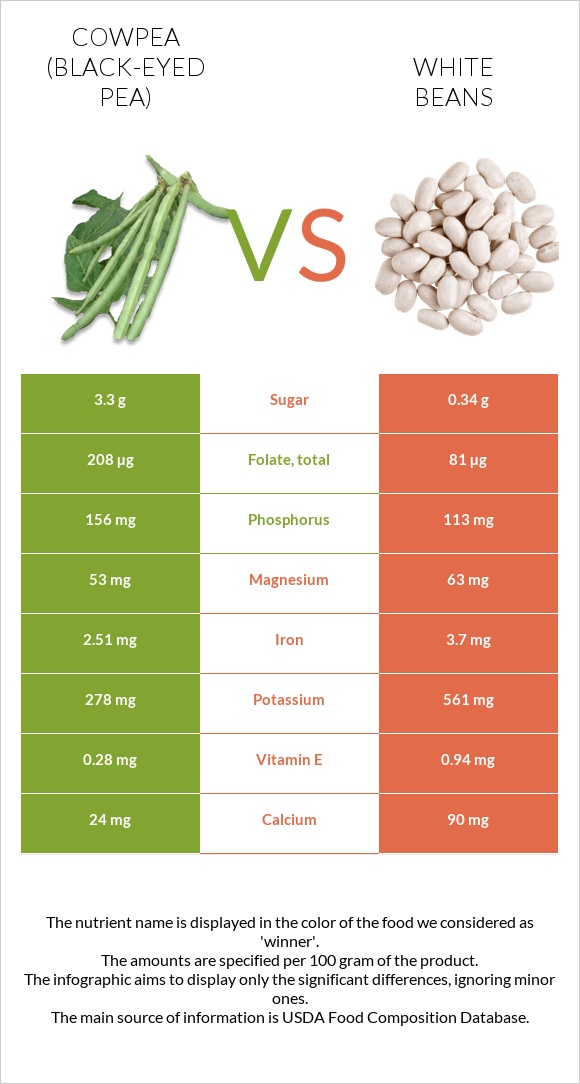Cowpea (Black-eyed pea) vs. White beans — In-Depth Nutrition Comparison
Compare
Summary of differences between cowpea (Black-eyed pea) and white beans
- Cowpea (Black-eyed pea) has more folate, vitamin B1, and phosphorus, while white beans has more iron, potassium, manganese, and calcium.
- Cowpea (Black-eyed pea) covers your daily need for folate, 32% more than white beans.
- Cowpea (Black-eyed pea) contains 10 times more sugar than white beans. While cowpea (Black-eyed pea) contains 3.3g of sugar, white beans contains only 0.34g.
These are the specific foods used in this comparison Cowpeas, common (blackeyes, crowder, southern), mature seeds, cooked, boiled, without salt and Beans, white, mature seeds, cooked, boiled, without salt.
Infographic

Infographic link
Mineral Comparison
Mineral comparison score is based on the number of minerals by which one or the other food is richer. The "coverage" charts below show how much of the daily needs can be covered by 300 grams of the food.
| Contains more PhosphorusPhosphorus | +38.1% |
| Contains less SodiumSodium | -33.3% |
| Contains more SeleniumSelenium | +92.3% |
| Contains more MagnesiumMagnesium | +18.9% |
| Contains more CalciumCalcium | +275% |
| Contains more PotassiumPotassium | +101.8% |
| Contains more IronIron | +47.4% |
| Contains more ManganeseManganese | +33.9% |
Vitamin Comparison
Vitamin comparison score is based on the number of vitamins by which one or the other food is richer. The "coverage" charts below show how much of the daily needs can be covered by 300 grams of the food.
| Contains more Vitamin CVitamin C | +∞% |
| Contains more Vitamin AVitamin A | +∞% |
| Contains more Vitamin B1Vitamin B1 | +71.2% |
| Contains more Vitamin B2Vitamin B2 | +19.6% |
| Contains more Vitamin B3Vitamin B3 | +253.6% |
| Contains more Vitamin B5Vitamin B5 | +79.5% |
| Contains more FolateFolate | +156.8% |
| Contains more Vitamin EVitamin E | +235.7% |
| Contains more Vitamin KVitamin K | +105.9% |
All nutrients comparison - raw data values
| Nutrient |  |
 |
DV% diff. |
| Folate | 208µg | 81µg | 32% |
| Iron | 2.51mg | 3.7mg | 15% |
| Potassium | 278mg | 561mg | 8% |
| Calcium | 24mg | 90mg | 7% |
| Manganese | 0.475mg | 0.636mg | 7% |
| Vitamin B1 | 0.202mg | 0.118mg | 7% |
| Phosphorus | 156mg | 113mg | 6% |
| Protein | 7.73g | 9.73g | 4% |
| Vitamin E | 0.28mg | 0.94mg | 4% |
| Vitamin B5 | 0.411mg | 0.229mg | 4% |
| Magnesium | 53mg | 63mg | 2% |
| Copper | 0.268mg | 0.287mg | 2% |
| Selenium | 2.5µg | 1.3µg | 2% |
| Vitamin B3 | 0.495mg | 0.14mg | 2% |
| Vitamin K | 1.7µg | 3.5µg | 2% |
| Calories | 116kcal | 139kcal | 1% |
| Carbs | 20.76g | 25.09g | 1% |
| Fiber | 6.5g | 6.3g | 1% |
| Zinc | 1.29mg | 1.38mg | 1% |
| Vitamin B2 | 0.055mg | 0.046mg | 1% |
| Vitamin B6 | 0.1mg | 0.093mg | 1% |
| Choline | 32.2mg | 35.1mg | 1% |
| Fats | 0.53g | 0.35g | 0% |
| Vitamin C | 0.4mg | 0mg | 0% |
| Net carbs | 14.26g | 18.79g | N/A |
| Sugar | 3.3g | 0.34g | N/A |
| Sodium | 4mg | 6mg | 0% |
| Vitamin A | 1µg | 0µg | 0% |
| Saturated fat | 0.138g | 0.091g | 0% |
| Monounsaturated fat | 0.044g | 0.031g | 0% |
| Polyunsaturated fat | 0.225g | 0.152g | 0% |
| Tryptophan | 0.095mg | 0.115mg | 0% |
| Threonine | 0.294mg | 0.409mg | 0% |
| Isoleucine | 0.314mg | 0.429mg | 0% |
| Leucine | 0.592mg | 0.776mg | 0% |
| Lysine | 0.523mg | 0.668mg | 0% |
| Methionine | 0.11mg | 0.146mg | 0% |
| Phenylalanine | 0.451mg | 0.526mg | 0% |
| Valine | 0.368mg | 0.509mg | 0% |
| Histidine | 0.24mg | 0.271mg | 0% |
Macronutrient Comparison
Macronutrient breakdown side-by-side comparison
Protein:
7.73 g
Fats:
0.53 g
Carbs:
20.76 g
Water:
70.04 g
Other:
0.94 g
Protein:
9.73 g
Fats:
0.35 g
Carbs:
25.09 g
Water:
63.08 g
Other:
1.75 g
| Contains more FatsFats | +51.4% |
| Contains more ProteinProtein | +25.9% |
| Contains more CarbsCarbs | +20.9% |
| Contains more OtherOther | +86.2% |
~equal in
Water
~63.08g
Fat Type Comparison
Fat type breakdown side-by-side comparison
Saturated fat:
Sat. Fat
0.138 g
Monounsaturated fat:
Mono. Fat
0.044 g
Polyunsaturated fat:
Poly. Fat
0.225 g
Saturated fat:
Sat. Fat
0.091 g
Monounsaturated fat:
Mono. Fat
0.031 g
Polyunsaturated fat:
Poly. Fat
0.152 g
| Contains more Mono. FatMonounsaturated fat | +41.9% |
| Contains more Poly. FatPolyunsaturated fat | +48% |
| Contains less Sat. FatSaturated fat | -34.1% |





